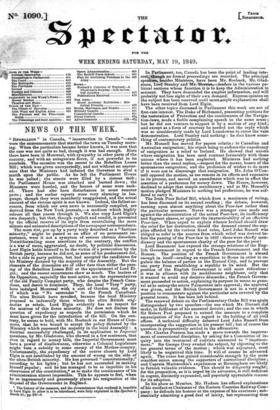NEWS OF THE WEEK.
44 REBELLION " in Canada, "insurrection in Canada "—such were the announcements that startled the town on Tuesday morn- ing. When the particulars became better known, it was seen that the case was not quite so bad, though it was bad enough. Riots there have been in Montreal, with sympathy in other parts of the country, and with an antagonism fierce, if not powerful in its numbers. The occasion was the assent to the Rebellion Losses Bill; which was given unexpectedly, and not without an appear- ance that the Ministers had induced the Governor to steal a march upon the public. As he left the Parliament House he was pelted ; the streets were filled by a riotous mob ; the Parliament House was attacked and burned down ; the Ministers were hustled, and the houses of some were sack- ed. There had also been disturbances in some remoter parts ; and the earlier reports were very alarming in lan- guage, though they were manifestly exaggerated, and the actual amount of the riotous spirit is not known. Indeed, the fullest ac- counts, from which our own news is necessarily compiled, are derived from the New York journals,—a medium which highly colours all that passes through it. We also copy Lord Elgin's own despatch ; but that, though explicit and candid, is prevented by the official reserve of its style from neutralizing the more minute and animated descriptions of the newspaper correspondents. The mere riot, got up by a party truly described as a "factious minority," might be passed as an affair of no permanent im- portance, were it not a symptom of serious chronic disorders. Notwithstanding some assertions to the contrary, the conflict is a war of races, aggravated, no doubt, by political dissensions. Lord Elgin holds himself to be the victim of a persecution by the British party, because he did not, as some of his predecessors did, take a side in party politics, but had accepted the candidates for his Ministry dictated by the majority of the Assembly. But the elements of the dissension are of older date than either the pass- ing of the Rebellion Losses Bill or the appointment of Lord El- gin ;_ and the recent occurrences show as much. The leaders of the Opposition, especially the most active, are the representatives of the old Family Compact party, who despise the French Cana- dians, and desire to domineer. They, the local " Tory " party, have indulged Montreal with a sort of Gordon riot, the cry of which was "No surrender " to the French Canadians. The ultra British have revolted, because the local Ministry proposed to indemnify those whom the ultra British stig- matize as rebels. Lord Elgin evidently has no respect for the motives of this fierce minority. He does not discuss the question of expediency as respects the permission which he must have given for the introduction of the bill. On the con- trary, he seems to hold, with Mr. Roebuck in our House of Com- mons, that he was bound to accept the policy dictated by the Ministry which possessed the majority in the local Assembly : a doctrine successfully challenged, in its application to Imperial questions, by Mr. Gladstone, who showed in a few sentences, that even in regard to money bills, the Imperial Government must have a power of disallowance, otherwise a Colonial Legislature might vote a subsidy to some enemy of the Mother-country. Unfortunately, the expediency of the course chosen by Lord Elgin is not established by the amount of wrong on the side of the ultra-British minority. He has governed "constitutionally," according to his lights ; but he has not succeeded in making himself popular • and he has managed to be so impolitic in his observance of the constitution,* as to make the continuance of his administration almost impossible. This he appears to feel, when he so ingenuously and generously places his resignation at the disposal of the Government in England.
* The history of the measure, and the circumstances that rendered it impolitic la Lord Elgin to allow it to be introduced, were fully explained in the Specials( r, March 81; pp. 297-8.


























